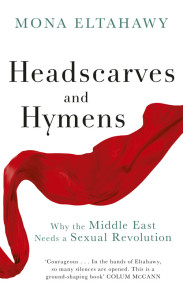 HEADSCARVES AND HYMENS: WHY THE MIDDLE EAST NEEDS A SEXUAL REVOLUTION
HEADSCARVES AND HYMENS: WHY THE MIDDLE EAST NEEDS A SEXUAL REVOLUTION
Mona Eltahawy
Hachette, April 2015, RRP $29.99
It’s hard to not be struck by the universality of sexism and sexual abuse while reading Headscarves and Hymens, a snapshot of sexual politics in the Middle East. Eltahawy paints a picture that is all too familiar. Women mustn’t travel alone, or even walk the streets, for their own “protection”. Wives who are beaten by husbands are asked, “What did you do to provoke him?” And it seems that women everywhere walk the tightrope between purity and wantonness, virgin and slut. You’ll be judged for what you wear, and blamed for provoking any abuse you experience.
And yet, there’s the uncomfortable awareness that in the west we’re still privileged, still lucky, because we won’t be forced to marry our rapist in order to protect our family from shame. A family member won’t physically restrain us while a cleric with a knife hacks at our genitalia. We won’t be arrested and violated under the thin veil of hymen inspection. There are places in the world where women are still treated as property, and whose everyday lives are subject to intimidation, humiliation and abuse.
Mona Eltahawy burns with feminist fury for the injustice of life as a girl or woman in the Middle East. Her own struggles and revelations of life as a teenager in Saudi Arabia highlight the absurdity of expectations that fuel her anger. She embraced the hijab in her youth in order to hide her pubescent body from the eyes and hands of men, only to discover that it did little to stop groping and pinching. If being covered in baggy cloth from head to toe still makes you a target of sexual assault, perhaps the problem is not so much the body of women but the inherent entitlement of men. Crazy, right?
More recently, her anger has been flamed by the hypocrisy of revolution. For a moment, the Middle East flared with the hope of political and social change. People walked the streets in solidarity, demanding that tyrants be destroyed and all people be treated as equal. Well, except for women, who should all go home. And here we see the dual struggle for women’s rights in the Middle East: a political system that oppresses everyone, and cultural mores that oppress women in particular. It’s a complicated mess of a problem.
And unfortunately, Headscarves and Hymens doesn’t seem to take us any closer to understanding how to make change possible.
While Eltahawy soars high on a jet stream of righteousness for social activism and political change, her lofty position of privilege means she advocates from a safe distance. We never feel as if we’re seeing from ground level, but always looking down, like benevolent observers. Rather than providing a nuanced view of life as a woman in the Middle East, her representations of women are defined by their relationships to and abuse by men (an irony given her outrage at women having no independent status), which makes for cardboard characters with limited sense of self.
Headscarves and Hymens is a superficial journalistic investigation of Middle Eastern sexual politics, with all the hearsay and hyperbole that comes with an emotional topic that hasn’t been well researched. Oh, if only for references! It’s a book that’s leaves you wanting. But it’s the kind of want that stirs you into reaching for the next book, and then out the door to a protest. The next step is then changing the world.

